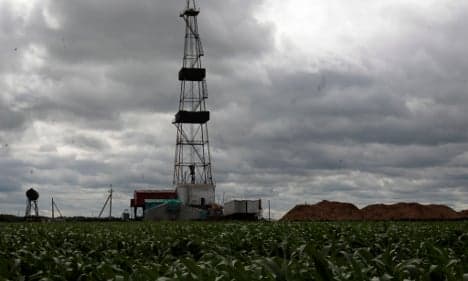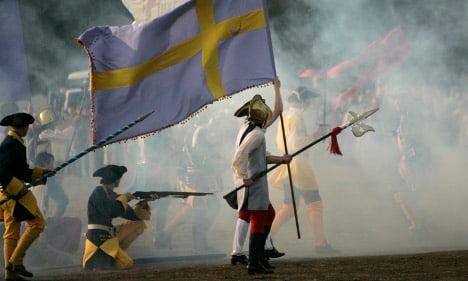Why Sweden and Russia are fighting over soil

Both Russian and Swedish media have been debating whether the Nordic nation is set to seal a controversial deal to buy Ukranian soil. Russia analyst Elena Bazina shares her take on what the fuss is about.
While Ukraine is on fire, other countries are trying to benefit from it.
Over the past week, Russian media sites have been discussing rumours that Swedes are set to buy a huge amount of Ukrainian black soil - a rich soil that contains a number of chemicals that help plants grow.
It's been claimed that around 50-100 million tonnes of very fertile Ukrainian chernozem (the technical term for the soil) will be delivered to Sweden and used at a nature reserve in Dalarna.
According to rumours, the soil will be taken mainly from Poltava region which is of historic importance when it comes to the relationship between the two countries.
The area is well-known for hosting the Battle of Poltava, when Russia's Peter the Great defeated Swedish forces under Karl XII in 1709.
So, the news that Swedes could end up possessing Poltava’s soil wounds the feelings of some Russians, who believe Sweden is still trying to get its revenge.

A reinactment of the Battle of Poltava in 2006. Photo: Sergei Chuzavkov/TT/AP
But while Russian social media have been rife with speculation that a deal is set to be done, with the soil to cost just five euros per tonne, Swedish officials have denied the rumours.
"It's the first time I've heard of it”, Andreas von Beckerath, the Ambassador of Sweden to Ukraine, told Swedish newspaper Dagens Nyheter last week.
However even without any firm evidence of the information that the Swedes are going to take soil from (formerly Russian land) in Ukraine, the fact that such a stir has been caused is highly significant.
It demonstrates the current tensions between Sweden and Russia and the ongoing competition between western and eastern countries for Ukraine's resources.
Remember, the conflict in Ukraine kicked off amid a row over whether it should push for closer links to the European Union or with Russia.
READ ALSO: Russia blames Sweden for Ukraine crisis
Ukraine has a lot to offer with its rich black soil. The country is often described as "Europe's bread basket". It has the eighth largest agricultural area on the planet and it is the world's third largest exporter of corn and sixth largest grain grower.
Taking advantage of the current unstable political situation, plenty of foreign investors have increased their shares in the Ukrainian agricultural sector in recent months.
Under Ukrainian law, farm land cannot be bought or sold, but companies can sign long-term leases for up to 49 years. And it seems that in this sector, companies are leaning towards welcoming more firms from the west rather than Russia.
About 20 percent of Ukraine's most fertile land is already controlled by large foreign firms (with long leases) including American companies Monsanto, Cargill, and DuPont.
According to Land Matrix, an independent global database that monitors land investment and ownership, the biggest investor in the Ukrainian agricultural sector is the US firm NCH Capital which controls 450,000 hectares, while Russian Renaissance Group is in second place with 250,000 hectares.
But Sweden, represented by Agrokultura AB and East Capital, also holds a sizeable chunk: 103,700 hectares.
So, as the real war goes on in eastern Ukraine, a war of contracts is going on in the Ukranian agricultural sector.
The current unstable situation certainly seems like a good opportunity for many foreign investors to sign profitable contracts.
However, if the hostilities in Ukraine continue, it will damage the agricultural sector and this could have a global impact - no matter who has invested in the country.
Farmers need credit to buy seeds and special equipment. But currently the interest rate is around 30 percent and the falling Ukranian grivna has led to increased costs for farmers seeking to import new tools.
The United Nations Food Agency has already reported that the Crimea crisis has pushed up global food prices by 2.3 percent.
If the fighting goes on in Ukraine it may no longer be able export grain.
In the most extreme scenario, we could have a major food crisis on our hands.
Comments
See Also
While Ukraine is on fire, other countries are trying to benefit from it.
Over the past week, Russian media sites have been discussing rumours that Swedes are set to buy a huge amount of Ukrainian black soil - a rich soil that contains a number of chemicals that help plants grow.
It's been claimed that around 50-100 million tonnes of very fertile Ukrainian chernozem (the technical term for the soil) will be delivered to Sweden and used at a nature reserve in Dalarna.
According to rumours, the soil will be taken mainly from Poltava region which is of historic importance when it comes to the relationship between the two countries.
The area is well-known for hosting the Battle of Poltava, when Russia's Peter the Great defeated Swedish forces under Karl XII in 1709.
So, the news that Swedes could end up possessing Poltava’s soil wounds the feelings of some Russians, who believe Sweden is still trying to get its revenge.

A reinactment of the Battle of Poltava in 2006. Photo: Sergei Chuzavkov/TT/AP
But while Russian social media have been rife with speculation that a deal is set to be done, with the soil to cost just five euros per tonne, Swedish officials have denied the rumours.
"It's the first time I've heard of it”, Andreas von Beckerath, the Ambassador of Sweden to Ukraine, told Swedish newspaper Dagens Nyheter last week.
However even without any firm evidence of the information that the Swedes are going to take soil from (formerly Russian land) in Ukraine, the fact that such a stir has been caused is highly significant.
It demonstrates the current tensions between Sweden and Russia and the ongoing competition between western and eastern countries for Ukraine's resources.
Remember, the conflict in Ukraine kicked off amid a row over whether it should push for closer links to the European Union or with Russia.
READ ALSO: Russia blames Sweden for Ukraine crisis
Ukraine has a lot to offer with its rich black soil. The country is often described as "Europe's bread basket". It has the eighth largest agricultural area on the planet and it is the world's third largest exporter of corn and sixth largest grain grower.
Taking advantage of the current unstable political situation, plenty of foreign investors have increased their shares in the Ukrainian agricultural sector in recent months.
Under Ukrainian law, farm land cannot be bought or sold, but companies can sign long-term leases for up to 49 years. And it seems that in this sector, companies are leaning towards welcoming more firms from the west rather than Russia.
About 20 percent of Ukraine's most fertile land is already controlled by large foreign firms (with long leases) including American companies Monsanto, Cargill, and DuPont.
According to Land Matrix, an independent global database that monitors land investment and ownership, the biggest investor in the Ukrainian agricultural sector is the US firm NCH Capital which controls 450,000 hectares, while Russian Renaissance Group is in second place with 250,000 hectares.
But Sweden, represented by Agrokultura AB and East Capital, also holds a sizeable chunk: 103,700 hectares.
So, as the real war goes on in eastern Ukraine, a war of contracts is going on in the Ukranian agricultural sector.
The current unstable situation certainly seems like a good opportunity for many foreign investors to sign profitable contracts.
However, if the hostilities in Ukraine continue, it will damage the agricultural sector and this could have a global impact - no matter who has invested in the country.
Farmers need credit to buy seeds and special equipment. But currently the interest rate is around 30 percent and the falling Ukranian grivna has led to increased costs for farmers seeking to import new tools.
The United Nations Food Agency has already reported that the Crimea crisis has pushed up global food prices by 2.3 percent.
If the fighting goes on in Ukraine it may no longer be able export grain.
In the most extreme scenario, we could have a major food crisis on our hands.
Join the conversation in our comments section below. Share your own views and experience and if you have a question or suggestion for our journalists then email us at [email protected].
Please keep comments civil, constructive and on topic – and make sure to read our terms of use before getting involved.
Please log in here to leave a comment.